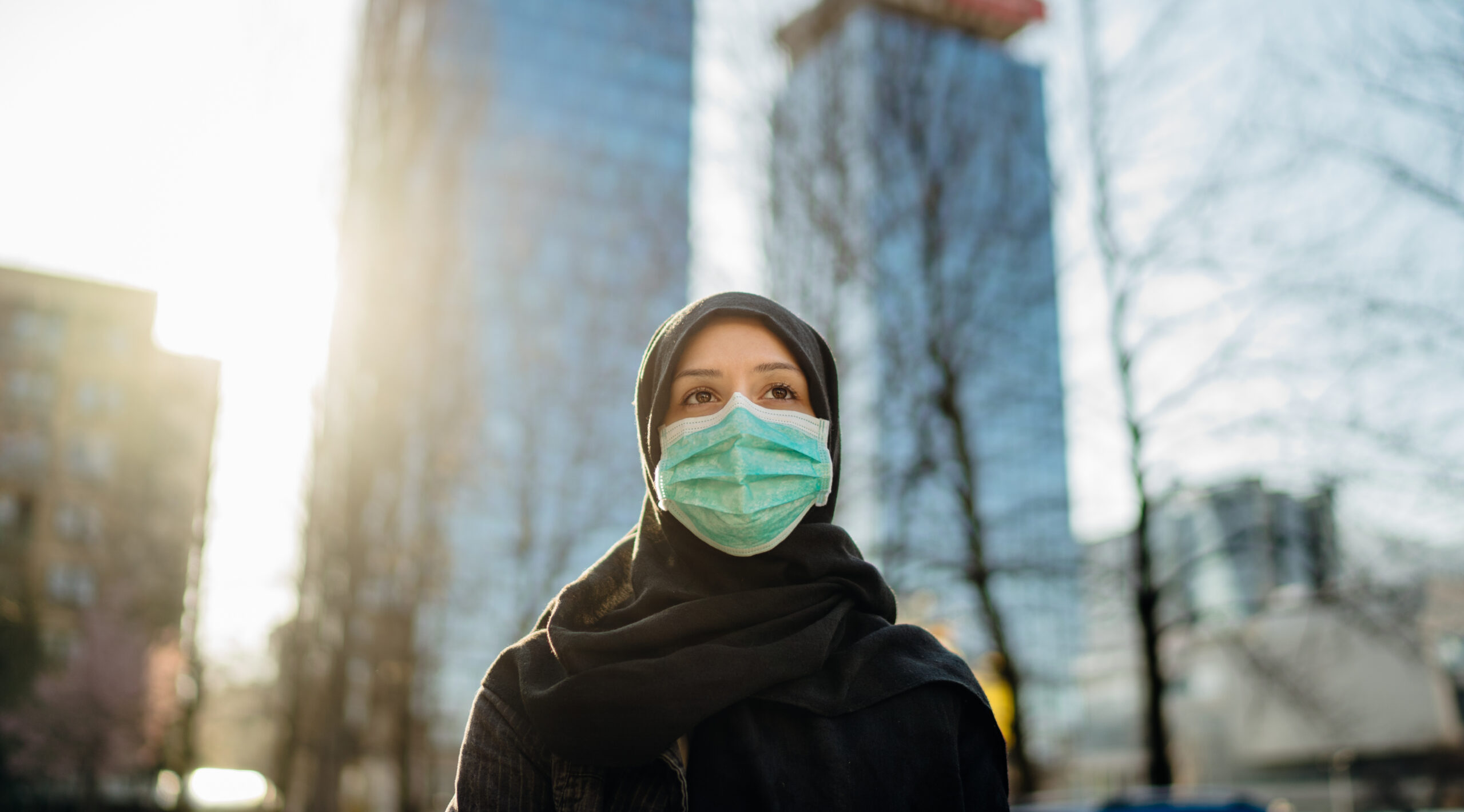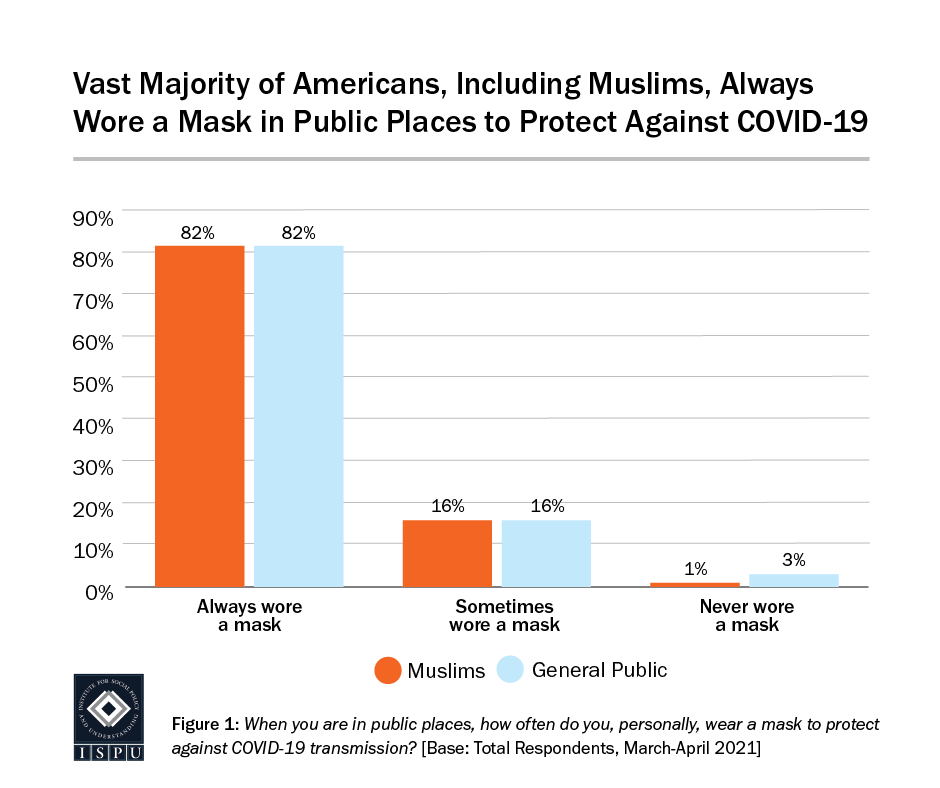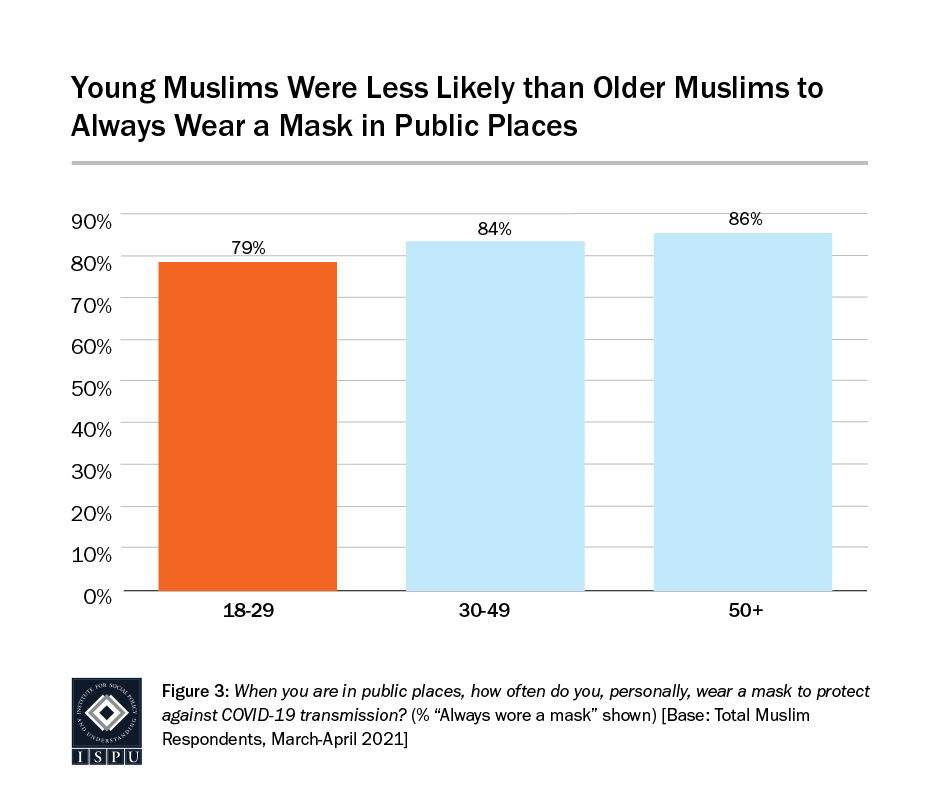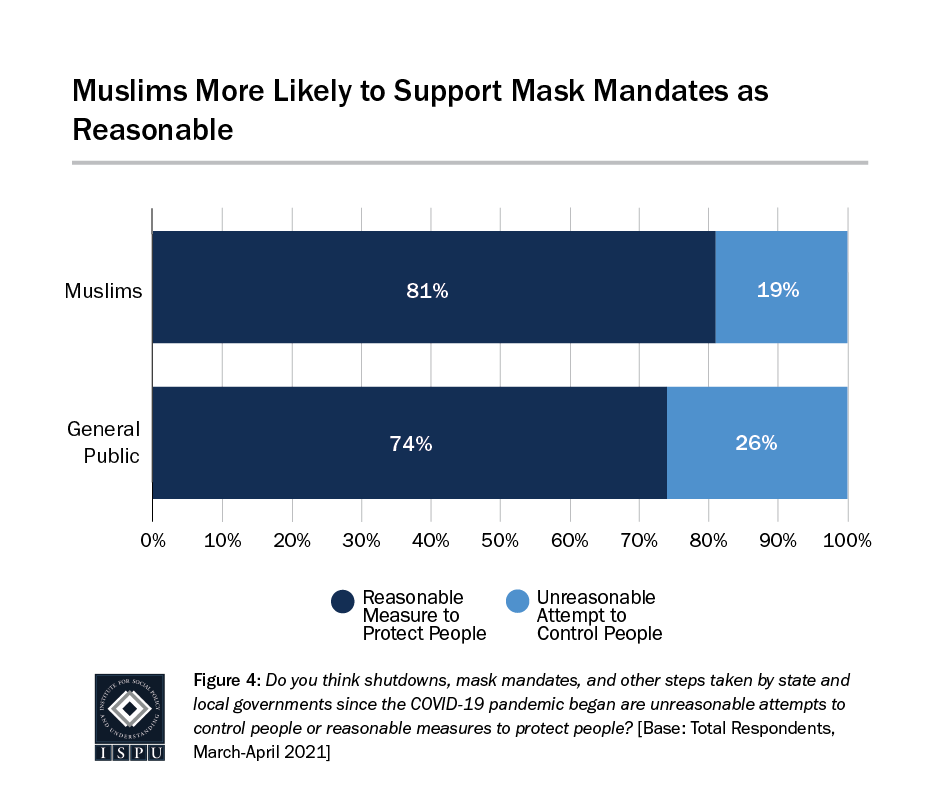
To Mask or Not to Mask, That is the Question
October 13, 2021 | BY MEIRA NEGGAZ
SUMMARY
At a time when face masks to protect against COVID-19 in America are flash points, new data show Muslims are as likely as the general public to wear masks for protection from COVID-19. They are also more likely to believe that mask mandates, along with other measures, are reasonable protection measures.
Although broad agreement by health officials and real world data show the effectiveness of face masks in reducing the spread of COVID-19, nearly two years into the pandemic, to mask or not to mask has been the question on everyone’s mind. Mask-wearing and the mandates requiring citizens to do so have been politicized from the early days of the pandemic and polarization on this issue has seemingly only increased. This, even as many states face yet another surge of COVID-19 cases and as many schools, workplaces and businesses reopen.
Public health officials pour over new information and continually revise recommendations based on real world data and the most current circumstances. State and local leaders fight over mask mandates. Individuals, business owners, and families are left having to make decisions regarding how best to protect themselves and their loved ones.
It is within this context that the Institute for Social Policy and Understanding (ISPU) explored attitudes and behavior related to mask-wearing among American Muslims and the general American public. Fielding our survey between March and April 2021, our findings reflect attitudes and practices a year into the pandemic, on the heels of a COVID wave, before vaccines became widely available, and masks were still the main tool for protection against COVID. The full survey methodology is available here.

To Mask or Not to Mask, That is the Question
October 13, 2021 | BY MEIRA NEGGAZ
SUMMARY
At a time when face masks to protect against COVID-19 in America are flash points, new data show Muslims are as likely as the general public to wear masks for protection from COVID-19. They are also more likely to believe that mask mandates, along with other measures, are reasonable protection measures.
Although broad agreement by health officials and real world data show the effectiveness of face masks in reducing the spread of COVID-19, nearly two years into the pandemic, to mask or not to mask has been the question on everyone’s mind. Mask-wearing and the mandates requiring citizens to do so have been politicized from the early days of the pandemic and polarization on this issue has seemingly only increased. This, even as many states face yet another surge of COVID-19 cases and as many schools, workplaces and businesses reopen.
Public health officials pour over new information and continually revise recommendations based on real world data and the most current circumstances. State and local leaders fight over mask mandates. Individuals, business owners, and families are left having to make decisions regarding how best to protect themselves and their loved ones.
It is within this context that the Institute for Social Policy and Understanding (ISPU) explored attitudes and behavior related to mask-wearing among American Muslims and the general American public. Fielding our survey between March and April 2021, our findings reflect attitudes and practices a year into the pandemic, on the heels of a COVID wave, before vaccines became widely available, and masks were still the main tool for protection against COVID. The full survey methodology is available here.
In Spring 2021, Majority of Muslims and the General Public Always Wear a Mask in Public Places to Protect Against COVID-19
The vast majority of American Muslims and Americans more broadly (each 82%) always wore a mask in public places to protect against COVID transmission, with 16% of each group sometimes wearing a mask and a fraction of the population (1% of Muslims and 3% of the general public) never wearing a mask. This is in line with the fact that, at the time our survey was fielded, 39 states across the political spectrum had issued mask mandates.
Political leanings are associated with the degree to which people mask. Among the very conservative, 71% of the general public and 83% of Muslims always wore a mask in public. Among the very liberal, 86% and 93% respectively always wore a mask. Interestingly, political affiliation is more related to the general public’s masking tendencies than to the tendencies of Muslims.
Young Muslims ages 18-29 were less likely than Muslims ages 50 and older to always wear a mask (79% vs. 86%) at the time of ISPU’s survey. Additionally, while Asian (88%), Black (86%) and Arab (83%) Muslims were on par in their use of masks all the time, white Muslims (76%) were less likely than Asian and Black Muslims to always wear a mask. There were no gender differences in mask use among Muslims. We find the same age pattern in the general public, with those aged 50 and older (90%) more likely to wear a mask all the time, compared with 18-29 (70%) and 30-49 year olds (70%). Among the general public, there are no gender or racial differences in mask use.
Muslims More Likely Than General Public to Support Mask Mandates as Reasonable
There is also broad understanding that masks are an important preventative measure, with the majority of Muslims (81%) and the general public (74%) agreeing that mask mandates and other similar policies are reasonable measures to protect people. Muslims were more supportive of these measures, however, and were less likely to believe them to be unreasonable (19% versus 26% of the general public).
Political affiliation has an impact on views of mask mandates. Muslims who identify as Republican are far more likely to view mask mandates as unreasonable as compared to Muslims who identify as Democrats or Independents (33% vs 17% and 15%). Even still, Republican Muslims are less likely to view these mandates and measures as unreasonable compared to the Republican members of the general public (33% vs. 47%).
Muslim women and Muslims over the age of 50 were most likely to feel that these measures were reasonable (84% of Muslim women vs. 78% of Muslim men; 87% of Muslims aged 50+ vs. 79% of 30-49 year old Muslims). There were no major differences across race/ethnicity among Muslims. Among the general public, there were no gender, age, or race differences in views of mask policies.
And, Muslims who knew someone that had been hospitalized or died from COVID were more likely to support these measures (87% versus 76%) and always wear a mask (greater than 90% versus 76%) than those who did not know anyone that suffered these negative effects.
Muslims were less likely to take a fatalistic view of COVID spread, with 19% believing that an outbreak of the size we have seen was inevitable, compared to 25% of the general public who believed that it was inevitable. As such, it is not surprising that Muslims would be more willing to support mandated protective measures.
Muslims More Likely to Help Others Access Personal Protective Gear
Beyond protecting themselves, Muslims were also more likely than members of the general public to assist others in protecting themselves. Muslims were almost twice as likely as compared to the general public to have helped provide personal protective gear, like masks, to others (15% versus 8%). Muslim men (21% vs. 10% of Muslim women), Muslims under the age of 50 (21% of 30-49 year olds and 14% of 18-29 year olds vs. 5% of Muslims aged 50 and older), and Arab and white Muslims (16% and 25% vs. 7% and 9% of Asian and Black Muslims) were most likely to have helped others gain access to personal protection.
Ever-Evolving Pandemic Response Requires Trust and Leadership
At a time when the wearing of protective masks evokes strong opinions, Muslims are largely aligned in their use and support of masking measures to protect against COVID-19. One reason for this may be that one in ten Muslims are medical workers serving the COVID response. Medical workers are used to wearing masks and are likely to see COVID close up or be at risk. Another factor may be that Muslims are more likely than the general public to live with extended family or parents (24% versus 12%), and mask wearing could protect themselves and their loved ones.
This alignment may also in part be due to the fact that Muslims largely consider themselves Democrats (59% versus 42% of the general public) and fewer consider themselves Republican (11% versus 24% of the general public). Since early on in the pandemic, there have been notable and very public differences in support for mask wearing and mandates along party lines, with Democratic leaders more likely to support and Republican leaders more likely to oppose. And, Muslims were more likely to trust leaders like Biden (89% versus 71% of the general public) and least likely to mistrust Dr. Anthony Fauci (13% versus 22%), both of whom have also been more supportive of mask wearing and mandates. Indeed, for those Muslims who trust Dr. Anthony Fauci a lot, 93% always wear a mask in public while for those who don’t trust him at all, 66% always wear a mask in public. Leaders shape the way the public responds and trust in leadership is a vital component of the public response.
The state of mask wearing and support for mask mandates in America is in constant flux as new public health studies on mask effectiveness are published, new variants emerge, COVID waves come and go, vaccines and boosters become available, and guidance from our leaders changes. As Americans continue to ask the question, to mask or not to mask, a number of factors come into play, not least of which is the response of leaders and the public trust in those leaders. In this current state of political polarization, simple yet proven measures to protect the health of Americans, such as mask wearing, are tearing families and communities apart and putting lives and livelihoods at risk. Bridging this gap is key to collectively getting back to normal. Additionally, further research is needed to see how attitudes and practices have evolved since the wide rollout of vaccines, widespread infection by the highly contagious Delta variant, and evolving guidance from health experts.

Meira Neggaz is the Executive Director at ISPU, where she is responsible for the institution’s overall leadership, strategy, and growth. Meira works to build and strengthen ISPU, to cultivate relationships with community leaders, policy makers, scholars, partner institutions and stakeholders, and to broaden the reach and impact of ISPU’s research. Learn more about Meira→






